Andy Ray’s Ten Best Films of 2022
2022 was the first year this decade in which the motion picture industry wasn’t, in some way, affected by the Covid pandemic. This year, we had a full slate of releases, and most theatres were operating at full capacity year ‘round. I feel like the quality of films we’re seeing still isn’t up to par with that of the twenty-teens (although last decade did set a very high bar), but 2022’s output was stronger than the previous two years. Still, I don’t think any film impressed me as much as Paul Thomas Anderson’s “Licorice Pizza” from last year; but the overall quality was improved. Following is my list of the tend best pictures of 2022:
 John Patton Ford’s first film was a showcase for the acting talents of young Aubrey Plaza, who was so great in 2017’s “Ingrid Goes West.” In 2022’s “Emily the Criminal,” Plaza plays a recent college grad with a dead-end job and a mountain of student loan debt. She takes a side gig working for Youcef (Theo Rossi), whose modus operandi is credit card fraud. Emily buys expensive goods, pays for them with stolen credit cards, and then quickly leaves the store before she can be found out. Upon returning the items to Youcef, Emily is paid handsomely for her “work.” As you might imagine, Emily’s life soon seems to spiral out of control. But Plaza never lets us feel as though Emily is not ultimately in charge of her own fate. “Emily the Criminal” was one of this year’s pleasant surprises.
John Patton Ford’s first film was a showcase for the acting talents of young Aubrey Plaza, who was so great in 2017’s “Ingrid Goes West.” In 2022’s “Emily the Criminal,” Plaza plays a recent college grad with a dead-end job and a mountain of student loan debt. She takes a side gig working for Youcef (Theo Rossi), whose modus operandi is credit card fraud. Emily buys expensive goods, pays for them with stolen credit cards, and then quickly leaves the store before she can be found out. Upon returning the items to Youcef, Emily is paid handsomely for her “work.” As you might imagine, Emily’s life soon seems to spiral out of control. But Plaza never lets us feel as though Emily is not ultimately in charge of her own fate. “Emily the Criminal” was one of this year’s pleasant surprises.
 Unlike 2019’s “Us,” Jordan Peele’s 2022 offering “Nope” was not a true horror film, but rather an eerie supernatural thriller. Daniel Kaluuya and Keke Palmer play brother-and-sister horse trainers who provide animals for movies and television shows. Amid an offer to sell their ranch to a local theme park operator, Peele’s original screenplay sets us on a course where we encounter a strange skyborne UFO with a sense of right and wrong that is not to be challenged. The underlying theme is the mistreatment of animals, but we may not realize that until days after the closing credits roll. While perhaps not as flat-out entertaining as “Us,” “Nope” is Peele’s most polished and “adult” film yet. I look forward to his next offering.
Unlike 2019’s “Us,” Jordan Peele’s 2022 offering “Nope” was not a true horror film, but rather an eerie supernatural thriller. Daniel Kaluuya and Keke Palmer play brother-and-sister horse trainers who provide animals for movies and television shows. Amid an offer to sell their ranch to a local theme park operator, Peele’s original screenplay sets us on a course where we encounter a strange skyborne UFO with a sense of right and wrong that is not to be challenged. The underlying theme is the mistreatment of animals, but we may not realize that until days after the closing credits roll. While perhaps not as flat-out entertaining as “Us,” “Nope” is Peele’s most polished and “adult” film yet. I look forward to his next offering.
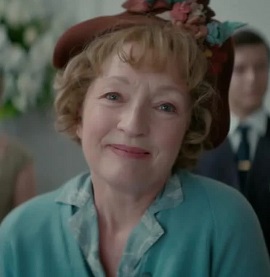 I believe everyone who saw Anthony Fabian’s “Mrs. Harris Goes to Paris” left the theatre wondering, “Why don’t they make more movies like this?” I can’t answer that question, but I can tell you that “Mrs. Harris” was easily the best film of the summer (and yes, I saw “Elvis” and “Top Gun: Maverick”). It was a low-key British charmer about a working-class cleaning lady who scrimps and saves so she can visit the Christian Dior headquarters in Paris and buy a nice dress. Affably played by character actress Lesley Manville, the initially passive Mrs. Harris turns out to be quite forceful as situations present themselves. She also serves as an inspiration to those around her, perhaps meddling but always with the goal of helping others. Manville’s performance is one of the year’s best, and Portugese actress Alba Baptista is strong in a supporting role.
I believe everyone who saw Anthony Fabian’s “Mrs. Harris Goes to Paris” left the theatre wondering, “Why don’t they make more movies like this?” I can’t answer that question, but I can tell you that “Mrs. Harris” was easily the best film of the summer (and yes, I saw “Elvis” and “Top Gun: Maverick”). It was a low-key British charmer about a working-class cleaning lady who scrimps and saves so she can visit the Christian Dior headquarters in Paris and buy a nice dress. Affably played by character actress Lesley Manville, the initially passive Mrs. Harris turns out to be quite forceful as situations present themselves. She also serves as an inspiration to those around her, perhaps meddling but always with the goal of helping others. Manville’s performance is one of the year’s best, and Portugese actress Alba Baptista is strong in a supporting role.
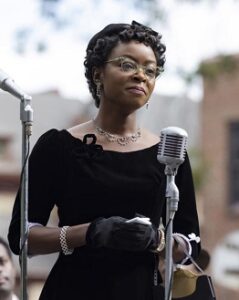 Most of us know the story of how 14-year-old Chicago resident Emmett Till visited his extended family in rural Mississippi in 1955, only to be savagely beaten to death when he supposedly whistled at a white female adult. His death sparked the Civil Rights movement, which eventually led to legislation in the 1960s that removed societal barriers faced by Southern blacks. I’m not 100% certain why this tragic story necessitated a 2022 motion picture treatment, but it never hurts to remind us not only how much things have changed during the past 67 years, but also how far we still need to go to achieve true equality among races. Chinoye Chukwu’s “Till” is a strong historically accurate period piece which achieves greatness because of the lead performance of Danielle Deadwyler as Emmett’s courageous yet tormented mother – who presses for an open-casket funeral to show the rest of the world how her son was treated. Deadwyler’s Oscar-worthy performance captures the heartbreak of a mother who lost her beloved son, while using that sorrow to fuel an inner fire to bring about much-needed social change.
Most of us know the story of how 14-year-old Chicago resident Emmett Till visited his extended family in rural Mississippi in 1955, only to be savagely beaten to death when he supposedly whistled at a white female adult. His death sparked the Civil Rights movement, which eventually led to legislation in the 1960s that removed societal barriers faced by Southern blacks. I’m not 100% certain why this tragic story necessitated a 2022 motion picture treatment, but it never hurts to remind us not only how much things have changed during the past 67 years, but also how far we still need to go to achieve true equality among races. Chinoye Chukwu’s “Till” is a strong historically accurate period piece which achieves greatness because of the lead performance of Danielle Deadwyler as Emmett’s courageous yet tormented mother – who presses for an open-casket funeral to show the rest of the world how her son was treated. Deadwyler’s Oscar-worthy performance captures the heartbreak of a mother who lost her beloved son, while using that sorrow to fuel an inner fire to bring about much-needed social change.
 And while I can say Danielle Deadwyler deserves a Best Actress Oscar for “Till,” her primary competition will be Cate Blanchett’s gripping portrayal of a tortured symphony orchestra conductor in Todd Field’s “Tar” – the year’s heaviest, yet most intriguing drama. Blanchett’s Lydia Tar is so very much in control of every aspect of her life, we know one of the story threads will be her downfall. Part of the excitement is guessing which one. This riches-to-rags story mirrors some of Martin Scorsese’s best work, but instead of a gangster, our protagonist is an orchestra conductor. Blanchett is so perfect here that it’s impossible to imagine anyone else in the lead role. She was excellent in “Carol.” She’s better here.
And while I can say Danielle Deadwyler deserves a Best Actress Oscar for “Till,” her primary competition will be Cate Blanchett’s gripping portrayal of a tortured symphony orchestra conductor in Todd Field’s “Tar” – the year’s heaviest, yet most intriguing drama. Blanchett’s Lydia Tar is so very much in control of every aspect of her life, we know one of the story threads will be her downfall. Part of the excitement is guessing which one. This riches-to-rags story mirrors some of Martin Scorsese’s best work, but instead of a gangster, our protagonist is an orchestra conductor. Blanchett is so perfect here that it’s impossible to imagine anyone else in the lead role. She was excellent in “Carol.” She’s better here.
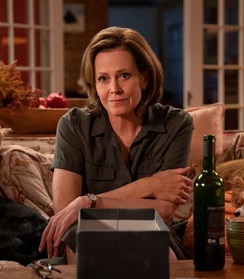 In my opinion, the three greatest films about the disease of alcholism are “The Lost Weekend,” “The Days of Wine and Roses,” and “Leaving Las Vegas.” Maya Forbes’ and Wally Wolodarsky’s “The Good House” isn’t up to that level. But it is very, very good. And much as with the men in those other films, Sigourney Weaver carries “The Good House.” Unlike those films, the alcoholic in question here is a woman. And more importantly, she doesn’t know she’s an alcoholic. She’s what social workers call a functioning alcoholic – able to carry out her career as one of the top two real estate agents in a fictional quaint New England seaside town, and able to serve as mother and grandmother to her close-knit family. But she has trouble taking just one or two social drinks. She drinks privately at night. She sneaks drinks when she’s able. She also has trouble remembering certain events, due to her affliction. While it sounds heavy, “The Good House” is instantly watchable, and it features another ambitious performance by one of our greatest actresses, Sigourney Weaver.
In my opinion, the three greatest films about the disease of alcholism are “The Lost Weekend,” “The Days of Wine and Roses,” and “Leaving Las Vegas.” Maya Forbes’ and Wally Wolodarsky’s “The Good House” isn’t up to that level. But it is very, very good. And much as with the men in those other films, Sigourney Weaver carries “The Good House.” Unlike those films, the alcoholic in question here is a woman. And more importantly, she doesn’t know she’s an alcoholic. She’s what social workers call a functioning alcoholic – able to carry out her career as one of the top two real estate agents in a fictional quaint New England seaside town, and able to serve as mother and grandmother to her close-knit family. But she has trouble taking just one or two social drinks. She drinks privately at night. She sneaks drinks when she’s able. She also has trouble remembering certain events, due to her affliction. While it sounds heavy, “The Good House” is instantly watchable, and it features another ambitious performance by one of our greatest actresses, Sigourney Weaver.
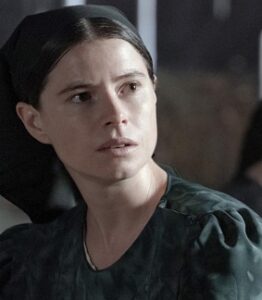 Sarah Polley’s “Women Talking” opens in a few weeks. It tells the story of a multi-generational group of Mennonite women living in a secluded farming community somewhere in rural North America, who have been repeatedly drugged and raped by the men of the association. The women gather to chart their course. Do they leave the colony altogether, stay and fight the men, or carry on as though nothing has happened? While this set-up may sound dull and wordy, it is anything but. Led by a stellar cast including Rooney Mara, Claire Foy, and the great Jessie Buckley, “Women Talking” is never less than captivating, and many times enthralling, as these isolated, uneducated women juggle their strong faith with their unfortunate reality. This is one of the year’s best films.
Sarah Polley’s “Women Talking” opens in a few weeks. It tells the story of a multi-generational group of Mennonite women living in a secluded farming community somewhere in rural North America, who have been repeatedly drugged and raped by the men of the association. The women gather to chart their course. Do they leave the colony altogether, stay and fight the men, or carry on as though nothing has happened? While this set-up may sound dull and wordy, it is anything but. Led by a stellar cast including Rooney Mara, Claire Foy, and the great Jessie Buckley, “Women Talking” is never less than captivating, and many times enthralling, as these isolated, uneducated women juggle their strong faith with their unfortunate reality. This is one of the year’s best films.
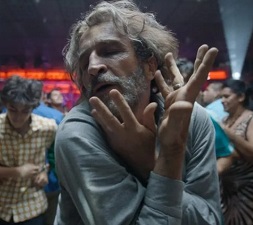 I’ve never been a fan of Mexican director Alejandro Inarritu, which is why I was blown away by his deeply personal film “Bardo.” It chronicles the life of a motion picture director who will never be able to call himself American, but who has been away from Mexico so long it doesn’t feel like home anymore. Featuring a brilliant performance by veteran Mexican actor Daniel Giminez Cacho as Silverio, “Bardo” weaves in and out of dream sequences, a la Fellini’s “8 1/2.” Told on both small and large scales, Silverio finds himself imagining a discussion with conqueror Hernan Cortes, and viewing battles of the Mexican American War. Yet in the film’s best sequence, he reconnects with his long-deceased parents. Some have complained that “Bardo” reeks of self-indulgence, and I can’t say I disagree with that statement. But it is also the year’s most challenging film, and one that begs for repeat viewings.
I’ve never been a fan of Mexican director Alejandro Inarritu, which is why I was blown away by his deeply personal film “Bardo.” It chronicles the life of a motion picture director who will never be able to call himself American, but who has been away from Mexico so long it doesn’t feel like home anymore. Featuring a brilliant performance by veteran Mexican actor Daniel Giminez Cacho as Silverio, “Bardo” weaves in and out of dream sequences, a la Fellini’s “8 1/2.” Told on both small and large scales, Silverio finds himself imagining a discussion with conqueror Hernan Cortes, and viewing battles of the Mexican American War. Yet in the film’s best sequence, he reconnects with his long-deceased parents. Some have complained that “Bardo” reeks of self-indulgence, and I can’t say I disagree with that statement. But it is also the year’s most challenging film, and one that begs for repeat viewings.
 By my count, Steven Spielberg has directed the best picture of the year five times. He almost makes it six this year with the autobiographical “The Fabelmans,” which not only recounts Spielberg’s formative years with his family, but his early interest in film – not so much the actors and actresses as the process by which films are made. As a boy, Spielberg (named Sammy Fabelman here) destroys his model train set – not because he wants to, but because he has to film it crashing four times so he can shoot the crash from every angle. “The Fabelmans” is practically required viewing for anyone with an interest in film. And for those without? It’s a wonderful, absorbing tale about growing up in the 1950s and ‘60s. Yes, Spielberg lays on the sentimentality a little too much on occasion, but the overall effect of his latest effort is absolutely enthralling. This is easily one of Spielberg’s ten best pictures – and (in his case) that’s saying something!
By my count, Steven Spielberg has directed the best picture of the year five times. He almost makes it six this year with the autobiographical “The Fabelmans,” which not only recounts Spielberg’s formative years with his family, but his early interest in film – not so much the actors and actresses as the process by which films are made. As a boy, Spielberg (named Sammy Fabelman here) destroys his model train set – not because he wants to, but because he has to film it crashing four times so he can shoot the crash from every angle. “The Fabelmans” is practically required viewing for anyone with an interest in film. And for those without? It’s a wonderful, absorbing tale about growing up in the 1950s and ‘60s. Yes, Spielberg lays on the sentimentality a little too much on occasion, but the overall effect of his latest effort is absolutely enthralling. This is easily one of Spielberg’s ten best pictures – and (in his case) that’s saying something!
-
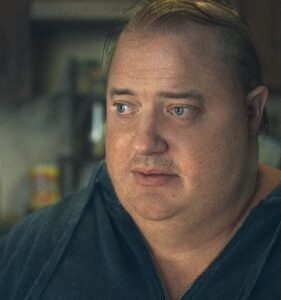 My only complaint with Darren Aronofsky’s “The Whale” is that it based on a stage play – and feels like it. But with all the action taking place in one apartment, that’s a difficult criticism to overcome. I loved everything else about “The Whale” – particularly the career-best performance by former comedic actor Brendan Fraser, who stars as Charlie, a 600-pound on-line-only English composition professor literally eating himself to death in solitude, following the death of his partner some years earlier. Coming into Charlie’s life is his teenage daughter, with whom he’s had a strained relationship. She says she simply needs help writing a paper for one of her classes, but she’s actually reaching out to rekindle a lost friendship. She’s played by Sadie Sink, who deserves a Supporting Actress nomination. In another compelling supporting role, Ty Simpkins plays a young missionary who attempts to “save” Charlie and introduce him to the ways of Jesus. Samuel D. Hunter’s adapted screenplay treats religion with the respect it deserves, and the inspiring final scene is reminiscent of that of “One Flew Over the Cukoo’s Nest.” “The Whale” is Aronofsky’s and Fraser’s best work yet. They should both be nominated for Oscars. I believe this is the year’s best film.
My only complaint with Darren Aronofsky’s “The Whale” is that it based on a stage play – and feels like it. But with all the action taking place in one apartment, that’s a difficult criticism to overcome. I loved everything else about “The Whale” – particularly the career-best performance by former comedic actor Brendan Fraser, who stars as Charlie, a 600-pound on-line-only English composition professor literally eating himself to death in solitude, following the death of his partner some years earlier. Coming into Charlie’s life is his teenage daughter, with whom he’s had a strained relationship. She says she simply needs help writing a paper for one of her classes, but she’s actually reaching out to rekindle a lost friendship. She’s played by Sadie Sink, who deserves a Supporting Actress nomination. In another compelling supporting role, Ty Simpkins plays a young missionary who attempts to “save” Charlie and introduce him to the ways of Jesus. Samuel D. Hunter’s adapted screenplay treats religion with the respect it deserves, and the inspiring final scene is reminiscent of that of “One Flew Over the Cukoo’s Nest.” “The Whale” is Aronofsky’s and Fraser’s best work yet. They should both be nominated for Oscars. I believe this is the year’s best film.
Andy Ray‘s reviews also appear on https://youarecurrent.com/category/nightandday/film-reviews/